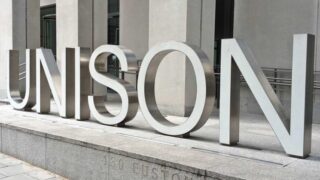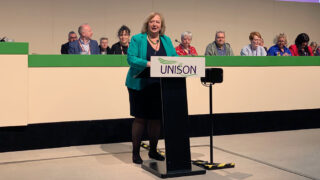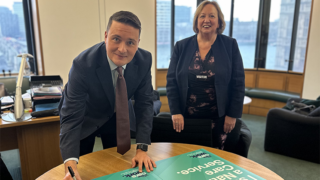Unleashing the potential in everyone and using the power of the collective to achieve that are the themes running through the annual Jimmy Reid Foundation lecture to be delivered by UNISON general secretary Christina McAnea in Glasgow later today (Thursday).
She will say: “It’s a huge privilege to be honouring one of Glasgow’s finest heroes. I heard Jimmy speak in the early 1970s in the Glasgow City halls. The place was packed to the rafters. I was about 15.
“He spoke for over an hour, but time passed in a flash. He had no notes as he walked up and down the stage, talking eloquently, with great passion. His deep, resonant voice filling the hall.
“I was utterly inspired. Jimmy remains one of the best speakers I’ve ever heard. He spoke passionately about injustice and the inherent goodness of people.
“Despite his awareness of the obstacles to be overcome, Jimmy was optimistic about the future. His was a message of hope he carried throughout his life.
“I didn’t walk out thinking, I want to be leader of a union. I didn’t even walk out thinking I wanted to work for a union. But thanks to Jimmy’s words, I walked out thinking deeply about what matters in life.
“Jimmy’s words – and his message – were so clear. Poverty is a choice made by the powerful. It’s not inevitable. We can do something about it.
“And to achieve that, we need to unleash everyone’s potential – to improve their chances of leading a fulfilling and productive life.
“But even now, opportunities for working class people are still far from what they should be. Life chances are still limited by class, gender, race and disability.
“I see the same thing every day in my job as general secretary of UNISON. Employers and governments constantly underestimating people. Equating low pay or lack of formal qualifications with low intelligence and ambition.
“Jimmy Reid was passionate about fighting inequality and the power of the collective. Every day I marvel at what this can achieve. Like the fantastic equal pay dispute in Glasgow, a campaign devised and led by those on strike, mostly low-paid women.
“Yet, the UK has the toughest industrial action legislation in Europe. And this lot in Westminster are determined to make it even more difficult to campaign for better pay and conditions for workers, with their threats to bring in even more restrictions on the right to strike.
“When we went into lockdown, it was obvious who were the essential workers. The cleaners, catering staff, refuse collectors, transport and food production staff, delivery drivers, health and care workers. Many doing jobs you never think of.
“It’s shocking how quickly they’ve been forgotten – especially by those in power. Now these same people are being told to ‘exercise pay restraint’ because ‘the country can’t afford to give them a pay rise’. But we can’t afford NOT to give them a pay rise.
“When working people get a pay rise, they don’t invest it in stocks and shares or buy a second home. They’re also extremely unlikely to use it to bet on whether the value of the pound will go up or down.
“They spend it locally, buying shoes for their kids, food in local shops and taking their family to the neighbourhood café or leisure centre.
“Giving a pay rise also helps essential public services at a time when they’re haemorrhaging staff and morale’s at rock bottom.
“Employers don’t hand out pay increases like confetti. Even when many say they’re sympathetic to the plight of workers, unions still have to negotiate wage rises. And sometimes, fight tooth and nail for them.
“Despite the impact of the pandemic, the rich have become even richer. Energy companies are predicted to make £170 billion in excess profits. The ten richest men in the world doubled their income during the two years of the pandemic.
“A pandemic that had a disastrous and disproportionate impact on women, black and disabled people. Where the poorer nations are still struggling to get vaccines and make any kind of economic recovery. This is economic violence on a global scale.
“In the UK, the Westminster government only seems prepared to intervene to help the rich. Its response to the cost of living crisis is to remove the cap on bankers’ bonuses and give tax breaks to the very rich – although as we’ve seen, this was a step too far even for some of their fellow Conservatives.
“But ministers are still ploughing on with cuts to corporation tax and capital gains tax. Apparently, they’ll use it to ‘create wealth’ and, miraculously, after having failed miserably in the past, ‘trickle-down economics’ will work its magic.
“Politicians should go to Drumchapel or Salford, the Welsh valleys, the Falls Road or the Shankill and ask people there how trickle-down economics is working for them.
“The prime minister openly states she doesn’t believe in redistribution. But she does. In her version, it’s about taking money from the poorest to give to the richest.
“An ideological position that flies in the face of long-term evidence from across the world that shows the more unequal a society is, the more everyone loses out. Income inequality hurts everyone in a society, even the wealthy.
“And the more equal a society is, the more likely it is to have good public services, which produce healthier, happier citizens.
“To fund public services and pay workers fairly there must be a fundamental change in how companies and individual wealth are taxed. Ensuring that those large multi-national companies – like Amazon and Google – pay their fair share.
“After all, they depend on staff being able to drive on well-maintained roads, where there’s a transport infrastructure, and have access to health, care and education services.
“If an Amazon warehouse caught on fire, they’d expect the local fire service to put it out. But they’re not paying for that service, we are.
“This is the worst economic crisis in over a generation. A crisis blighting many people’s lives. But people are fighting back.
“UNISON is running ballots in areas we never thought we would – in the Environment Agency and the Food Standards Agency.
“There’s currently a dispute in the university sector, with porters and administrative staff standing up for better pay.
“This week, our industrial action ballot started in the NHS in Scotland, and in a couple of weeks another will in the NHS in England, Wales and Northern Ireland. That means by November, UNISON will be balloting almost 400,000 NHS workers. The sheer logistics are massive.
“Of course, NHS members voting for strike action will be accused of putting lives at risk. But I’ve been speaking to nurses, ambulance workers and hospital cleaners who say the service is already on its knees. Things are so bad that going on strike won’t actually make anything worse, but it will draw attention to the situation.
“We don’t bring people out to bring down governments, we bring them out to get results. To improve their pay and conditions.
“In the public sector, we need to put pressure on employers – but, critically, we also need to put pressure on governments who control the funding.
“The media focused on the rubbish building up on the streets in Edinburgh during the festival. Yet that was a relatively small number of people on strike.
“We were due to bring out school staff the following week, but this action forced employers, and crucially the Scottish government, to come back and negotiate. That new offer has now been accepted.
“Unions have to make a difference to people’s lives and win for them. UNISON will work with any government. Governments in Scotland and Wales (and even Northern Ireland, when they have one) see unions as part of civil society, not the enemy within, unlike the current lot in Downing Street.
“During the recent local government talks in Scotland, the Scottish government was in the room. Nicola Sturgeon got personally involved and I know Mark Drakeford would do the same. I can’t imagine Liz Truss doing that.
“There’s also increasing co-operation between unions. Unions have always worked together, but we’re now seeing more and more of that.
“Unions won’t allow the right to fall back on discredited economic policies or to push the burden and blame for poverty and low pay onto individuals. That’s always their go-to response. If only you worked harder, had two jobs, did longer hours or just got a better job, your life would be fine.
“So, we need to keep the focus, as Jimmy Reid would have done, on the power of the collective.
“Unions are the ultimate collective. Making sure people have enough money to live a decent life is the first step. But Jimmy Reid was adamant that improving lives involves more than simply putting money in pockets.
“He said, ‘to measure social progress purely by material advance is not enough. Our aim must be the enrichment of the whole quality of life’.
“That’s our aim too. Unions don’t just focus on improving pay and conditions, but on giving everyone the chance to fulfil their potential, to be whatever they want to be.
“Unions are also a force for change. That’s why fighting for equality is so important, as is ending poverty.
“Unions take governments to court when they introduce blatantly unfair laws – like tribunal fees – a great human rights victory for UNISON.
“That commitment to progress through collective action is why I – and most in this room I suspect – are trade unionists. That passion and anger against injustice is still the driving force in our lives.
“Hearing Jimmy Reid speak all those years ago set me on the path I follow today. It helped me turn my youthful anger into something positive.
“Like him, I also have faith in humanity – and an unshakeable belief in the transformative power of the collective. Jimmy Reid was a realist – but he never let realism dampen his optimism. And neither must we.”
Notes to editors:
– Christina McAnea will deliver the ninth annual Jimmy Reid Memorial Lecture, entitled Tory Turmoil and the Cost of Living Crisis: Challenges and Opportunities for our Trade Unions. It takes place at 7.10pm today (Thursday 6 October) at the Banqueting Hall, City Chambers, Glasgow. Tickets are available here.
– UNISON is the UK’s largest union with more than 1.3 million members providing public services in education, local government, the NHS, police service and energy. They are employed in the public, voluntary and private sectors.




